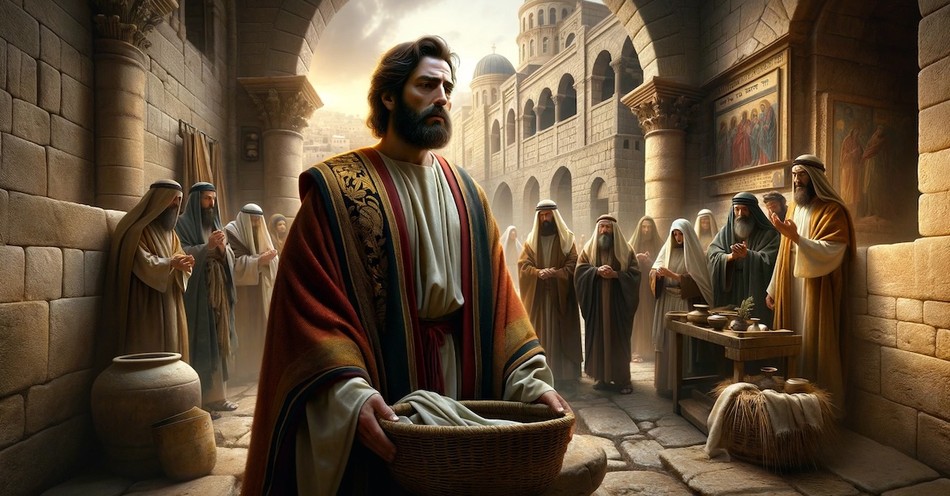Although the Bible records little about Joseph of Arimathea, it does share his critical decision to request the body of Jesus after the crucifixion. God gives each person unique and special qualities to further His kingdom. Joseph of Arimathea was a dedicated follower of Jesus. His devotion was evident when he decided to ask for the body of Jesus and take care of His body after death.
What Does the Bible Tell Us about Joseph of Arimathea?
The life of Jesus was filled with pain, heartbreak, hope, faith, trust in His Father, and love beyond comprehension. Perhaps Joseph of Arimathea felt the devotion of Jesus to His followers.
Jesus obeyed His Father in every moment. His life provided the ultimate example of true dedication to God.
Jesus taught others, shared the message of His Father, and cared for the downtrodden, sick, lowly, and unwanted. Jesus spoke with people of all ages.
Joseph of Arimathea was one of Jesus’ followers. Some scholars say he may have been a secret disciple (John 19:38). Scripture says he was fearful of the Jewish leaders, even though he was in a powerful position.
The book of Mark states that Joseph of Arimathea was a respected member of the Sanhedrin (Mark 15:43). He was said to have been wealthy, good, and righteous. Did he help supply Jesus with food, travel expenses, or other needed things? The Bible does not give specifics about his daily interactions with Jesus.
Before the events leading up to the crucifixion had occurred, Jesus needed to be with His Father.
Jesus prayed in the Garden of Gethsemane, asking His Father to let the cup pass from Him if possible and if it was what God wanted. (Matthew 26:39) The cup would not pass. Jesus would be tried and crucified.
Brought before Caiaphas, Jesus was interrogated, “But Jesus was silent.” (Matthew 26:63 NIV). After the denial by Peter, Jesus was taken to Pilate.
The chief priests and elders met and decided to put Jesus to death. “Early in the morning, all the chief priests and the elders of the people made their plans how to have Jesus executed. So they bound him, led him away and handed him over to Pilate the governor.” (Matthew 27:1-2 NIV)
After Pilate questioned Jesus, Pilate asked the crowd which prisoner to release, Jesus or Barabbas. The people chose to release Barabbas. Pilate then handed over Jesus to be crucified.
Jesus was stripped of his clothing and covered in a scarlet robe. A twisted thorn was put on his head. After a reed was placed in His right hand, Jesus was spat on. Soldiers mocked Jesus and said, “Hail, King of the Jews.” (Matthew 27:29 NIV)
Jesus was then led away to be crucified. Jesus was forced to carry His cross to where He would be crucified. Likely due to the torture He had endured, Jesus needed help carrying the cross. A man from Cyrene named Simon helped Jesus carry the cross. This event may remind us that we can carry one another’s burdens.
Scripture does not state where Joseph of Arimathea was located at that time. Perhaps he was watching in the distance. Maybe he was mixing in with the crowd.
Why Did Joseph of Arimathea Give Jesus His Tomb?
The Bible tells that after the crucifixion of Jesus, Joseph of Arimathea went to Pilate and asked for the body. Pilate could have answered with a resounding no, but he did not. Pilate ordered the body be given to Joseph of Arimathea.
Scripture shares that Pilate wondered if Jesus was already dead. Perhaps Pilate thought Jesus may still be alive even after the horror on the cross. When Pilate learned that Jesus was dead, he granted the body to Joseph of Arimathea.
As a devoted disciple of Jesus, Joseph showed respect and love for his teacher.
The fact that he gave Jesus his tomb fulfilled a prophecy in the book of Isaiah: “He was assigned a grave with the wicked, and with the rich in his death, though he had done no violence, nor was any deceit in his mouth.” (Isaiah 53:9 NIV)
Joseph of Arimathea took the body of Jesus, wrapped it in a clean linen cloth, and laid it in his own tomb. Another man was there with him. Nicodemus also came to claim the body.
Why two men? Was it because the stone would be so heavy that two people needed to move it? Or was Nicodemus a witness to prophecy being fulfilled?
In the book of John, we learn that Nicodemus brought a mixture of myrrh and aloes to prepare the body. Jesus was placed in the tomb on the Jewish day of Preparation. Joseph and Nicodemus prepared the body of Jesus by wrapping Him in strips of linen and a mixture of myrrh and aloe.
Joseph was showing honor and respect for Jesus and also fulfilling prophecy.
Mary Magdalene and Mary, the mother of Joses, saw where the body was laid.
What Happened to Joseph of Arimathea after Jesus’ Resurrection?
Scriptures do not give details of what happened to Joseph of Arimathea after the resurrection of Jesus. Some historians believe he became a missionary and preached the gospel in England.
Joseph is an example of how God can use any person to share His message. There may not be many details of the life of Joseph of Arimathea before or after the crucifixion. Yet, he was vital to fulfilling prophecy.
Why is Joseph of Arimathea Connected to the Holy Grail?
There are varying legends about the Holy Grail. One such story says the grail is the cup that Jesus drank from at the Last Supper. Other stories say that Joseph of Arimathea used the vessel to collect Jesus’s blood when Jesus was crucified.
Another legend says that the grail was taken to England by Joseph of Arimathea and that he buried it there.
Movies and books have tried to explain or explore the history of the holy grail. As Christians, we can rely on Scripture and not speculation.
While part of the Easter story is filled with heartache, torture, and death, the most crucial part of the story comes in the empty tomb and the resurrection of Jesus. As we journey through the Easter season, there are opportunities for reflection and developing a stronger relationship with God. Placing colorful flowers on a cross at church, attending special worship services observing Ash Wednesday, Maundy Thursday, Good Friday, and then Easter morning are ways to draw closer to Jesus.
“For God so loved the world that he gave his one and only Son, that whoever believes in him shall not perish but have eternal life.” (John 3:16 NIV)
From each moment leading up to Easter to the times afterward, Christians share, “He is Risen! Risen Indeed!”
A Prayer for Holy Week
Heavenly Father, thank You for the gift of Your Son and for the light that came after the darkness. Thank You for Joseph of Arimathea and Nicodemus, who fulfilled prophecy by taking care of the body of Jesus. May we remember the love and sacrifice of Jesus. Amen.
In His Name,
Melissa Henderson
Further Reading:
What is the Importance of the Empty Tomb?
Why Did Only the Women Go to Jesus’ Tomb?
Who Was Nicodemus in the Bible & Was He Saved?
Photo Credit: Image created using AI technology via ChatGPT's Dall.e

Melissa is the author of Licky the Lizard and Grumpy the Gator. Her passions are helping in the community and church. Melissa is an Elder, Deacon, and Stephen Minister.
Follow Melissa on Facebook, Twitter, Pinterest, and at https://www.melissaghenderson.
Learn more about the meaning and significance behind the Easter holiday and Holy Week celebrations:
What is Lent? and When Does Lent Start?
What is Ash Wednesday? and When is Ash Wednesday?
What is Palm Sunday?
What is Maundy Thursday?
What is Good Friday? and When is Good Friday?
What is Holy Saturday?
What is Easter? and When is Easter Sunday?
Easter Bible Verses
The Resurrection of Jesus
Easter Prayers

.jpg)


.jpg)